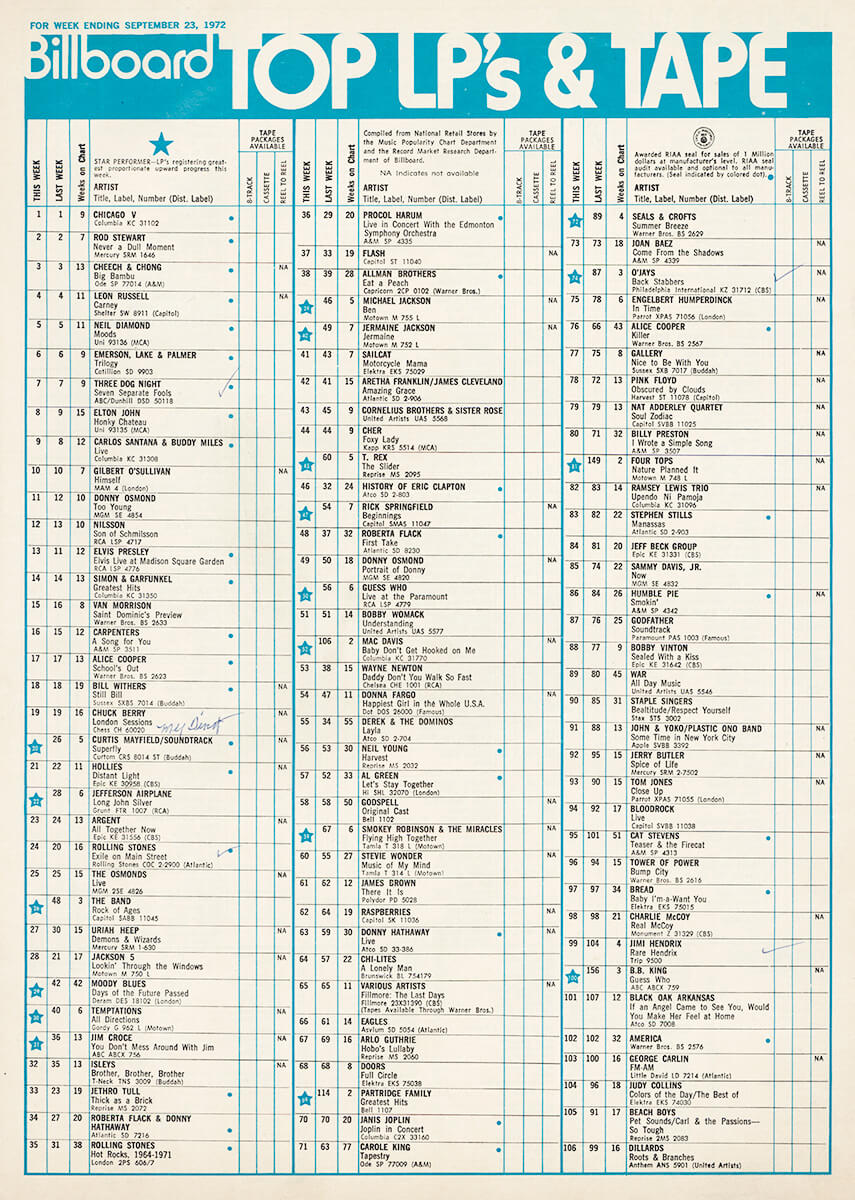Album Guide
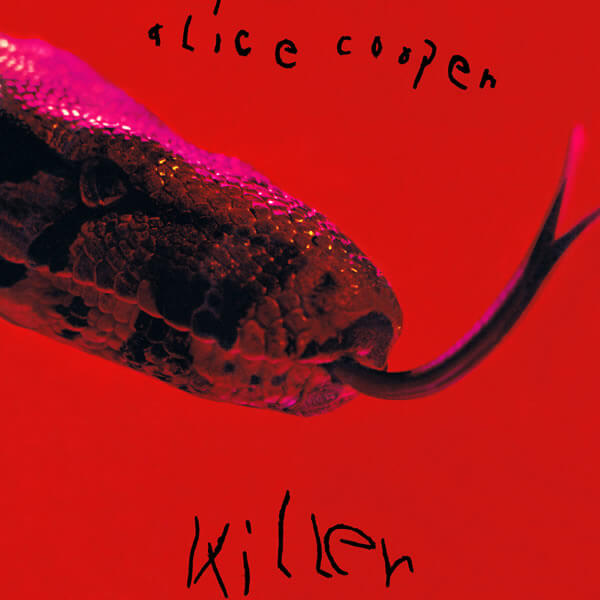
Killer (1971)
Track listing: Under My Wheels / Be My Lover / Halo of Flies / Desperado / You Drive Me Nervous / Yeah, Yeah, Yeah / Dead Babies / Killer
All songs arranged by Alice Cooper group and Bob Ezrin.
String and horn arrangements by Bob Ezrin. Additional lead guitar on "Under My Wheels" by Rick Derringer
Recorded at RCA, Chicago
Produced by Bob Ezrin
Killer (1971)
PRESS RELEASE:
"shocking"
- Memphis News
"thrilling"
- San Antonio News
"gets you thinking... carefully calculated and precisely performed"
- Life
"fascinating
- Buffalo Evening News
"overwhelming"
- St. Louis Dispatch
"downright inpsiring"
- Hit Parader
"incredibly imaginative"
- Cincinnati Post
"pure entertainment"
- Milwaukee Journal
Los Angeles Times
Time was when the presence of Alice Cooper onstage was enough to empty a crowded ballroom in five minutes.
Today, as they vividly demonstrated in their first local appearance as headliners Sunday evening at the Long Beach Auditorium, Alice Cooper is not only supremely worthy of an audience's sticking around, but possibly the most exciting American rock act rolling as well.
Today the group is joyously realizing its brave ambitions of putting on the most astonishing theatrical rock show ever. Gone, having been replaced by impeccable timing and control, is the enjoyable but ultimately only partially satisfying chaos that once characterized the group's performances, and gone too, having been replaced by genuine invention is the derivativeness (of the Who, the Velvet Underground, and the Stooges) that for a long time made it impossible for some people to perceive even the commendability of their ambitions.
Alice himself, now moving and singing with unprecedented assurance, is finally the completely unsettling psychedelic tart he's always wanted to be. His fellows have added readily-discernible competence to energy among their musical credentials. And their arsenal of new and ingenious props and lighting are nothing short of stunning.
In their Sunday evening performance each of the Coopers' songs was a more emphatic knockout than its predecessor. "Sun Arise" and their two indisputably superb hit singles.
"Caught in a Dream" and "I'm Eighteen," were utterly smashing musically. "The Ballad of Dwight Fry," the last half of which saw Alice singing in a straight-jacket, was a simply unforgettable theatrical spectacle. And even "Black JuJu" which was long just an embarrassment, proved an altogether splendid set-closer in its revised form, which involves the use of an electric chair and a pillow-feather blizzard.
— JOHN MENDELSOHN
Billboard
Alice Cooper added another piece to the brain-squeezing puzzle of their whatfor, but no sooner does the piece fall in than the puzzle seems to explode out anew, bigger, brighter and beyond a shadow of a doubt, and into this year's butterfly in the ointment of the music business. What is Alice Cooper? And why not? New vocabularies have erupted in explanation, many as a substitute for acceptance, but all that Detroit Alice seems to ask is the brief suspension of your imagination (assuming you've got one), to lift a few veils and be entertained. No experience necessary. The rest is the best theatrical rock 'n' roll show since the Stones, and under the cover of live snakes and above solutions sizzles some of the most stoned-out electric hard rock imaginable.
A well-behaving boa constrictor, blinking electric chair weird glass wands that bend and shoot soundwaves, straightjacked w/nurse, and a smokey and feathery finale — all revolve around Alice, who breaking in a new pair of black tights for the evening's performance as well as some new tricks. But whatever actually occurred in that liberated, metamorphic zone of Charlie Carnal's powerful light show and searing, screaming rock of Cooper-Bruce remains a matter for the moment. "I'm Eighteen," their breakthrough single, Rolf Harris' "Sun Arise," "Caught In A Dream" and "Body" are wedded and welded together in the lightning excitement, creating a kinesthetic environment all their own.
— ED OCHS
Chicago Sun-Times
Alice Cooper is beautiful!
That's the rock group — all men — who stage a most unusual and fascinating show Saturday night in the Opera House. Almost any group would have looked good after the drivel offered by the first two acts, but Alice was manificent — and managed to save the night for those who weren't driven away earlier.
Alice Cooper is also the adopted name of the group's lead singer. If he was also the one who devised the elaborate lighting and stage business for his group's set, he is more than just a powerful singer or group leader.
Most superior rock group leaders know the importance of visuals in their performances. Some, like Pete Townsend of the Who, admit that they plan movements to emphasize their music. Others may not be so open, but it's obvious that the movements of Mick Jagger, Ian Anderson, Elton John and others are not unconscious and natural as they might like us to think.
ALICE COOPER GOES one step further. They plan and prepare their visual act and carefully co-ordinate special lighting effects to achieve maximum impact. Because they are able to add to the staging some fine hard rock performances the total adds up to something exciting rather than contrived.
Saturday night they played all but one song off their magnificent "Love It to Death" album, and, song by song, they built up the drama, until the climax of "Black Juju," where the group disappeared in a stageful of smoke and feathers.
The two special poles of lights set up in the orchestra pit lit small patches of the stage in turn during the first number, "Sun Arise," showing the group in silvery, shiny jumpsuits.
FOR THE SECOND number, Alice put on a tall pointed hat, either of a magician or a religious, and sang "Hallowed By My Name." Then came "Caught In a Dream," leading right into their big hit, "I'm Eighteen."
During "Is It My Body," Alice did an appropriate striptease, hanging his jumpsuit over the huge white cross in the center of the stage. Now wearing what looked like a leotard and black tights, he wound a huge snake around his neck and toyed with it.
As the song ended, a nurse in immaculate white led him off-stage. He returned seconds later in a straightjacket to sign the electrifying "Ballad of Dwight Fry," a monolog by an insane hospital inmate.
Then something tall covered in a white sheet was wheeled in as the drummer started building up the beat to "Black Juju." It turned out to be a dummy on a throne.
ALICE DEPOSED the dummy and stabbed him to death with a spear for good measure. Then he assumed the throne himself, and all of a sudden, flashes of light started coming from his head as he lifted up a huge chain watch and hypnotized the audience with its pendulum swing.
When all was calm, he suddenly woke everyone up with the aid of a powerful spotlight-flashlight that he beamed into the audience, waving it madly in circles. Then came the smoke, wind machines and other effects as the song ended with the audience first stunned, then screaming for more. Alice Cooper, when heard, played some of the most solid, exciting rock since the Faces and Rolling Stones left town.
— AL RUDIS
LIFE
The advanced publicity for Alice Cooper almost turned my stomach. The pictures showed a kohl-eyed queen, cadaver face framed in a rat's nest of teased black hair, camping it up with a whole warehouse of lurid props, everything from a boa constrictor to an old-fashioned mission-oak-and-leather-strap electric chair. The advertising copy was the usual I-can't-see-anything-wrong-with-it palaver about "contemporary theater" and rock as "total experience" and the wondrous fact that we all have male and female traits. After surveying the whole hyped-up spiel, I concluded, "If that's where it's at, who needs it?"
Then I saw the show and ditched my preconceptions. The moment Alice sidled across the stage — in a black leotard zipped down to his navel — I recognized that he/she/it was thoroughly professional. Every provocative move and theatrical flourish was carefully calculated and precisely performed.
What gets everybody uptight with Alice Cooper is the sacrifice he makes of shame. Confessing fantasies most people would sooner die than reveal he becomes the scapegoat for everybody's guilt and repressions. People project on him, revile him, ridicule him, revile him. At the same time, he knocks out the young boys with the daring of his act and the rebelliousness of his images. After all, the ultimate rebellion of our time is the simple refusal to be a man.
— ALBERT GOLDMAN
Buffalo Evening News
Alice Cooper, the rock group, is as much what it looks like as what it sounds like.
Playing hard and insolent rock-theatre into the adolescent rebellion, the devilishly anti-what-every-you-can-think-of (except anti-rock) group, drew a screaming, bouncing bopper response Sunday the likes of which haven't been seen since Paul Revere and His Raiders played Memorial Auditorium in the mid-60s, and a band of little girls chalk scrawled "We love Paul' on the sidewalk.
The Alice trip at Melody Fair SUnday night was an experience in soundsight indeed larger than itself: A well of electronics filling up the inside of tent canvas, layering tone in the folds for a second-delay playback. A recapitulation of the years of rock theatrics, from Frankie Lyman and the Teenagers' two-step dip-dedoodle through Paul Revere in three-cornered hat. An evocative support to peer identity and rebellion.
THE THEATER of Alice — Alice being the name of both the group and its lead singer — is a Theater of Cruelty. NO more cruel, of course, than the psycho-sexual revolution its audience experiences, but nonetheless hard and very anti, as hard and as anti as rock has been to authority since it began.
"I'm 18 and I don't know what I want," sings Alice, whose name is an anti-hero affectation of style, and who really, said someone who knows, is as red-blooded as any young American male chauvinist.
The next line in the song, however, qualifies what IS known: "I got to get away; I got to get out of this place," and you can picture thousands of young people signing it to their parents, their college, their anything that binds.
In another song, Alice fights to escape from a straight jacket. He does; the drums do cathwunk; the light comes down, and the audience yells: 'Yeh! Yeh!"
"ALICE COOPER," reads a release from the press agent, "the product of this new American lifestyle."
And, Alice, it goes on, was taught by a Phoenix hypnotist "to become three equal parts: Male for strength; female for wisdom; and child for faith."
Preening with his hair, slipping a shoulder out of his skin-tight balck costume; then aggressively swinging a sword, then a hammer; coaxing, chiding, preaching to his audience, pummelling a stuffed doll with a spear; heaving chicken features into the audience; Alice sings "You'd better tell me what I really am."
But he knows. He's quite a show.
And, he knows, too, what he's about musically. More controlled, tighter, using rhythm change and intricate guitar webs for good purposes now, the Alice sound, backed by two guitars, an organ and drums, has come a long way together since his first major appearances in this area several years ago.
— ANTHONY BANNON
Hollywood Reporter
Starting at about 8 o'clock Wednesday evening strange peo-pie began strolling into the ??m-bassador Hotel, past the main desk to whispers of "Well, they don't dress up anymore, do they?" and such things, to what will be undoubtedly remembered as the high point of the current Rock 'n' Roll social season.
Set in the decorous and yet sparkling atmosphere of the Ventian Room, the event was termed by Warner Brothers Records officials as "Alice Cooper's Coming Out," and was attended by an all-star list.
Among others seen boogieing from bar to dance floor, and down the hors d'oeuvres line were Richard Chamberlain and his lovely date (we didn't catch he name in the crush), Gordon Lightfoot, Randy and Rosevita Newman, Rod McKuen, Dan Wakefield and Eve Babitz, Ahmet Ertegun, Earl McGrath, Bob Regehr (one of WB's official hosts, and doing a splendid Job), Bob Gibson, Cynthia Plaster Caster, Donovan, Coby Atlas, Robert Hilburn, Lee Purcell, Mike Love and Bruce Johnson of the Beach Boys, Lewis Segal, Martin Cerf, Gary Stromberg, the Cockettes (Goldy Glitter, Bobby, Miss Pristine Condition, and Sylvester), Mel Blye, and WB Records toppers Mo Ostin and Joe Smith. An air of expectancy infused the crowd when it was reported that even Mayor Yorty was in the area, and might possibly drop in to wish Alice well.
Entertaining before the main attraction were the Cockettes, circulating as cigarette girls, two young men as mechanical mannequins who left in their wake sheer amazement at their charming movements, TV Mama (introduced by the leader of her band with "She may be TV mama to you, but to me she's TV dinner,") and the orchestra was Edward Gould's. The Cockettes were flown in from San Francisco at great expense.
When the bright wonderful people were finally treated to Alice's entrance, the scene was tumultuous. Cloistered upstairs in a sumptuous Ambassador suite until just the correct moment Alice trooped through the door of the Venetian Room in tux to "Stairway to the Stars," Edward Gould's strings playing.
The Cockettes dropped long stemmed roses in his path. Alice looked warm and vibrant, and experts noted that he had never performed better. The Queen Mother could be seen brushing a tear from her eye, Shimmering sound by Tycobrae.
— J. G.




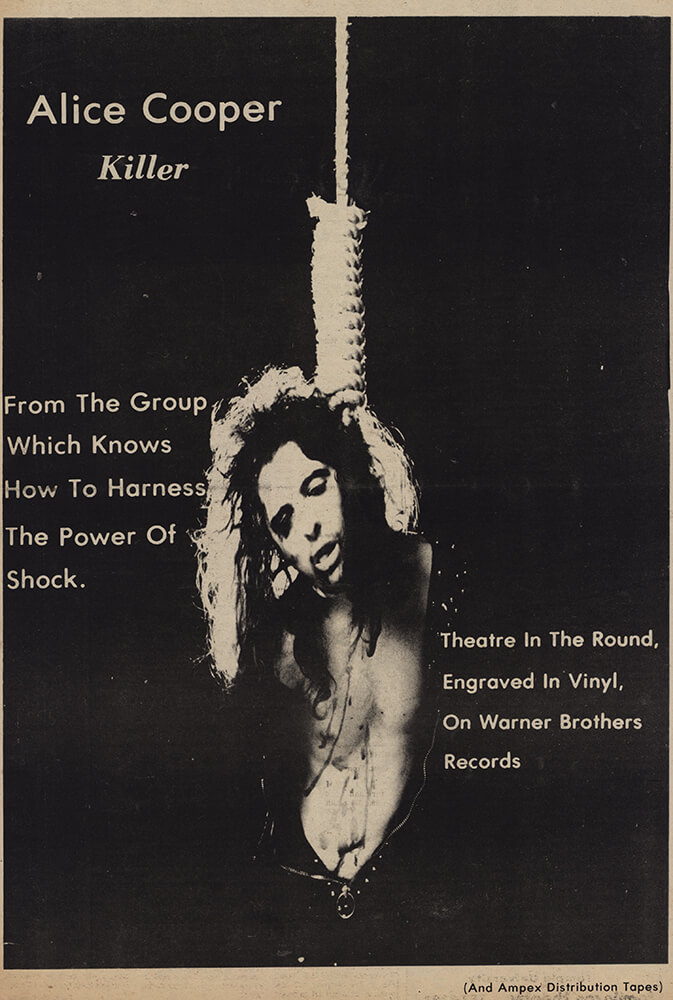


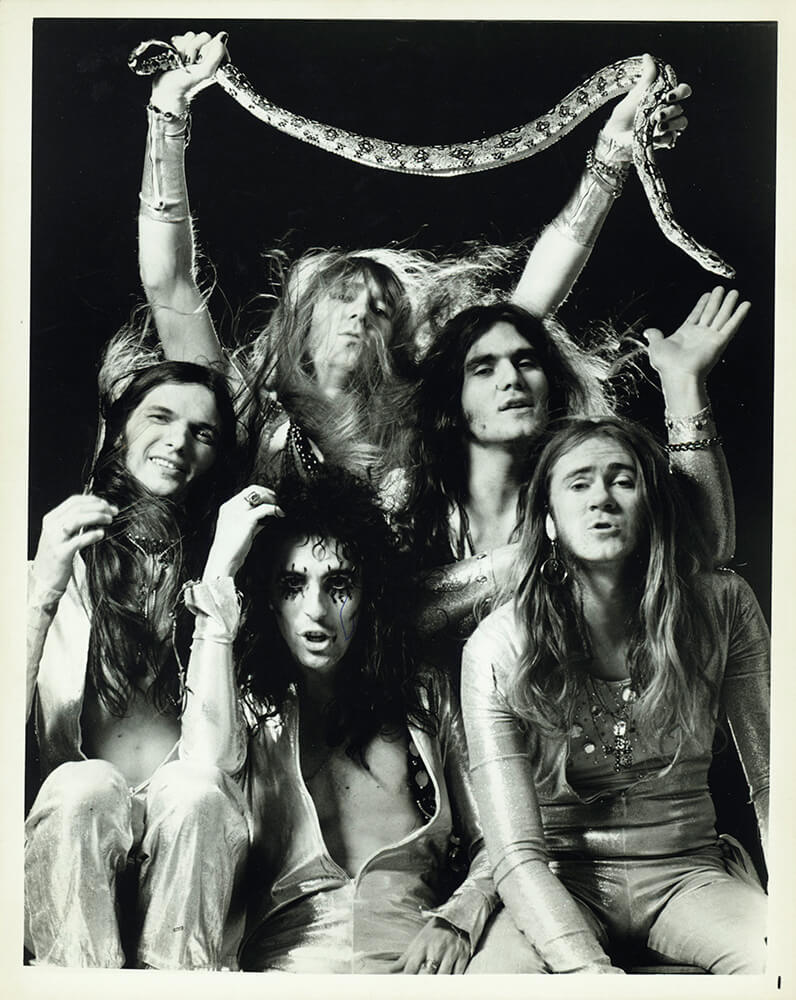
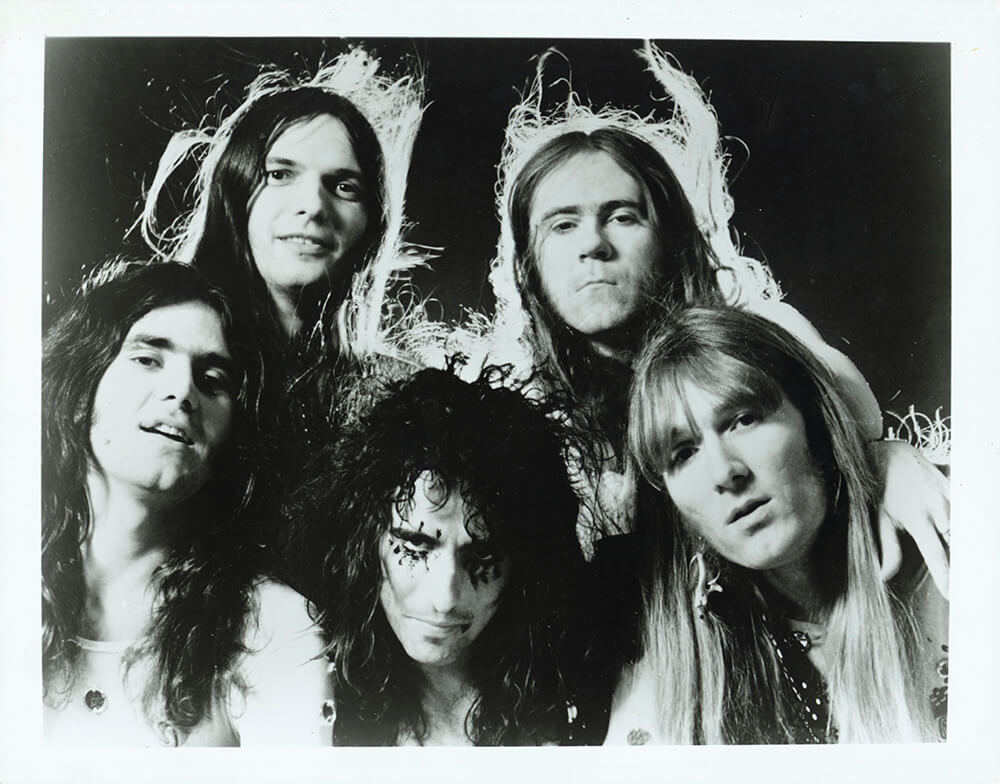
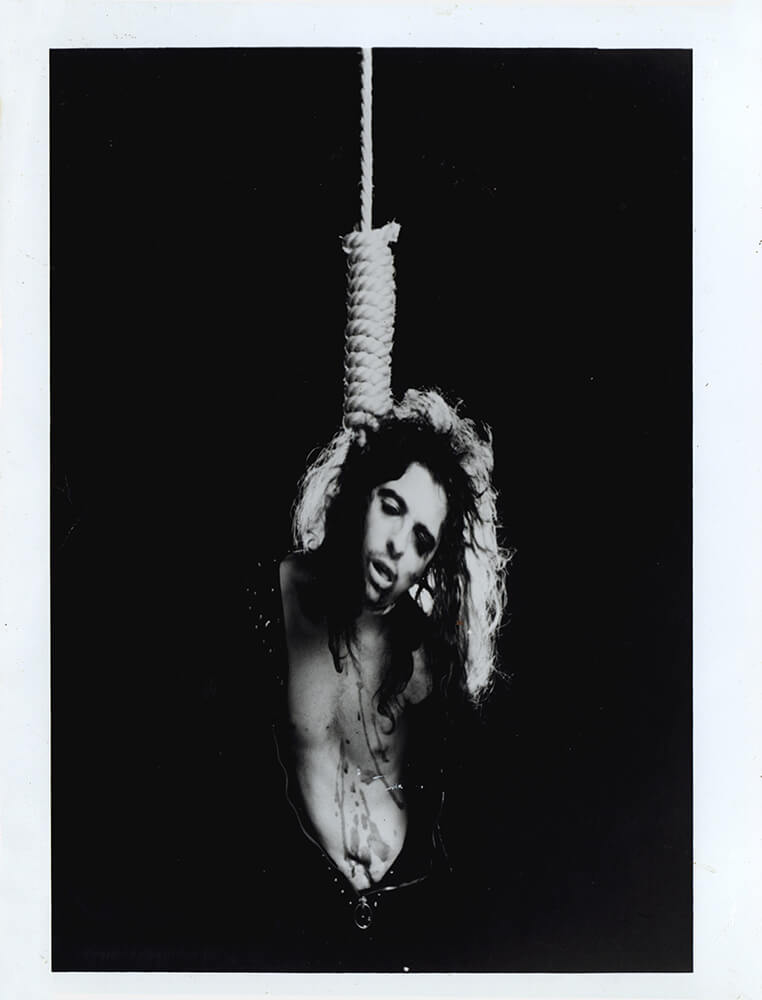

![Killer US Press Release [Page 1] (1971)](/albums/images/killer/details/press-release-us-page1.jpg)
![Killer US Press Release [Page 2-3] (1971)](/albums/images/killer/details/press-release-us-page2-3.jpg)
![Killer US Press Release [Page 4] (1971)](/albums/images/killer/details/press-release-us-page4.jpg)
